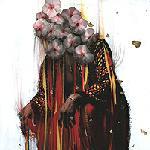
Teebs Collections 01
(Brainfeeder)
On YouTube, there's a BBC interview with Alejandro Jodorowsky, the cult director, mime, comic book artist, spiritual author, tarot card expert, and occasional actor. At around six minutes and forty one seconds, the interviewee (an Englishman whom we never see) asks Jodorowsky, “but as an artist you don't just make films, you write and...” – then Jodorowsky cuts him off, extends his arms with opens hands, looks down at the glass counter and says, in a thick accent: “because I am an artist, I am not a zombie!” He pauses, stiffly sniffs, looks at the Englishman and adds: “Because the person now in our civilization are becoming zombies. They do only one thing, like a machine.”
Mtendere Mandowa, an LA-based producer on Flying Lotus' Brainfeeder label, aka Teebs, is definitely not a zombie, or a machine. He's a painter whose paintings – large canvases that utilize dripping techniques, multi-coloured psychedelic abstractions, and shifts in landscape perspectives – have graced his album covers. He's a young producer whose music has been part of the Southern Californian movement known as the “beat scene,” even though it has perhaps suffered from being overlooked. And, he's still an avid skateboarder.
Listening to his new album, Collections 01, Mandowa's production has blossomed handsomely since his 2009 debut, Ardour. These new ten tracks, freshly scented in enormous fields of flowers and dutifully arranged as precise and faithful as the maps of an ancient cartographer, are impregnated with an enchanting passion that only certain animals – doves, seahorses, and piebalds, to name a few – carry with them wherever they roam, wherever they take shelter, and wherever they die. Like a Jodorowksy scene, these songs are the stuff of symbols, passing clouds, and small, quotidian raptures that would otherwise go unnoticed if Mandowa didn't have the perseverance to engage their attention and pull them in with his favourite hawser: an SP 404.
Online, there are several interviews with Mandowa, in both text and video. He's been asked questions regarding a college degree, (he dropped out) if he's had musical training (“no, not at all” he says) and how exactly he makes his music. He admits that he's heavy on sampling (he manipulates other recordings), records random instruments borrowed from friends, and masters everything on an “old Fruity Loops program.” But what's even more interesting about his music-making is its constant intermixing with his artmaking. He describes a normal day as such: “Now it's like, I come home, wake up – probably working on some art, wait till it dries, walls drying, work on music. When I get a headache I go back and work on some art again, cause this is probably dry by now and then I can see what I can do with it – with fresh eyes. I just go back and forth.”
Mandowa has put his artwork up in galleries around the world, and has performed live around it too, always acknowledging how unreal and exciting his experiences abroad have been. However, the worlds of his art and music are “the same and separate,” he mentions. Death and life; strife and peace; inner turmoil and outer raptures – all drift inside and outside of his songs. There is a kind of Buddhist acceptance in their dust-covered loops, and in their atmospheres: the continuation of life after death – something that Mandowa encountered not long ago, when his father succumbed to terminal cancer. Thus his work is a reincarnation of yesterday's passions, and moreover, a capturing of the universe's inner commotions, both swirling in a blur of sunshine. His artwork's blobs, smears, and splotches are as resonant to reincarnation as his music's shaky beats, mid-afternoon wind-chime lulls, and woolgatherings accompanied with a cup of tea.
Like a zen koan, Collections 01 provokes enlightenment without giving a single answer – it never gives an answer. It is how spacious its ten songs are that makes them accessible; they're spontaneous and unhurried, gathering momentum in an opaque density, smothered with the visions of rainbow-coloured birds in flight above a rainforest canopy. They have the fresh smell of laundry, the juicy taste of a plum. They're good at blowing soft breezes from a window into a cool bedroom, and capturing the beauty of natural instances: children laughing, a vole traveling over wet cobblestones, the ancient smell of horse manure mixed with old hay.
And like Jodorowsky's oeuvre, they are spiritual. However, they never surrender to cosmic inquietudes – they're songs that would rather wear graphic tees than monk robes. Though he may propose otherwise, Collections 01 is Mandowa letting air out of his memory, squeezing the kneaded blanket of his consciousness and refreshing his spirits; he is not only moving forward after the death of his father, but also, Mandowa smithing sound with such sweet fragrance. As a result, his manipulations have gotten more patient, his sketches have become full tunes, and half-obscured melodies have received a lighting from the lamps. But what kind of spirituality is Collections 01, exactly? In the words of Mandowa himself, it is “a feeling of reaching inner peace.”
6 December, 2011 - 13:29 — Michael Iovino